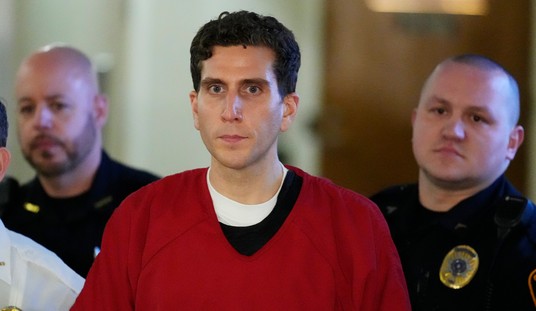Looks like Congress picked the wrong week to give up publicity stunts and pointless gestures. Rep. Adam Schiff (D-CA), ranking member of the House Intelligence Committee, announced today that he’s proposing a bill that will prevent “this President or any other from abusing the pardon power for their own personal benefit or to obstruct justice.”
It also looks like some in Congress picked the wrong week to read up on the Constitution:
NEW: Rep. Adam Schiff introduces bill to prevent any president "from abusing the pardon power for their own personal benefit or to obstruct justice." https://t.co/xhb2g8kjkw pic.twitter.com/yXNllqh5zE
— ABC News (@ABC) April 18, 2018
California Rep. Adam Schiff (D) has introduced a bill that would give Congress oversight on any pardon granted by President Trump to a subject of the Russia investigation or any other criminal matter involving his family members.
In a press release Tuesday, Schiff announced the Abuse of the Pardon Prevention Act, which would force the Justice Department to turn over case files for any investigation involving a member of the president’s family to the House Judiciary Committee if that family member is granted a pardon.
The catalyst for this, according to Schiff’s statement, was the pardon of I. Lewis “Scooter” Libby. What that has to do with Trump’s personal benefit is anyone’s guess. Trump has no love for the Bush administration or the Iraq War that Libby helped create. It was obviously a political statement, but most pardons are political statements. Obama used the pardon power sparingly until his final two years, but then focused his clemency actions mainly on his campaign to reform federal sentencing guidelines for non-violent crime. He also commuted the sentence of Bradley/Chelsea Manning, presumably to push back against the use of the Espionage Act for presumed “whistleblowers,” and then granted clemency to notorious FALN terrorist Oscar López Rivera, who never exhibited genuine remorse for his crimes. Those were just as political, and Bill Clinton’s pardon of Marc Rich was notoriously corrupt, to which we’ll return in a moment, but Democrats didn’t seem too interested in probing that in early 2001.
After the Libby non-sequitur, Schiff told USA Today that the purpose is to deter Trump or a future president from the temptation to pardon his way out of a scandal:
If a pardon is granted under those circumstances, the attorney general would have to turn over the case files from the investigation to the House and Senate Judiciary committees and — if the probe involves intelligence or counterintelligence matters as it does in the Russia investigation — to the House and Senate Intelligence committees.
Congress could release information from the files to the public and possibly use it as the basis to impeach the president.
“It would allow Congress to determine whether a pardon is an effort to obstruct justice,” Schiff said in an interview. “I think it would have the effect of discouraging a pardon used for the purpose of shielding the president or his family from prosecution.”
There are a number of issues with that argument and Schiff’s bill. Let’s start with the pragmatic. There is zero chance that this will get considered in committee, let alone on the House floor, so it’s clearly unserious to its core. Even if by some miracle both Paul Ryan and Mitch McConnell took it up and passed it, guess who’d have to sign it into law? In that way, it’s just as silly as the Operation Protect Mueller bill that McConnell scotched last night.
The real problem for Schiff here, though, is the Constitution, about which Schiff seems oddly unfamiliar. The power of the pardon is plenary and fully resides in the executive, according to Article II Section 2. The only limitations on the pardon power is that it relates to “offences against the United States” (ie, not valid for violations of state and/or local laws), and that it cannot undo impeachment by the legislature. The inclusion of that exclusion is significant, too; the Constitution explicitly delineates the legislative interest in pardons, excluding it from any formal role at all in overseeing it.
That plenary authority strengthens any claim to executive privilege for materials relating to a president’s deliberations on pardons, too. Congress can demand materials on investigations from the Department of Justice already as part of its existing oversight, but a president would be able to shield any notes related to discussion of the pardon easily, Schiff’s bill notwithstanding. Congress can’t pass a statute limiting executive privilege, just as it can’t limit pardons by statute either. They both originate from the Constitution, not statute.
That doesn’t leave Congress with no options, however. If a president abuses his power to obstruct justice, Congress has the power of impeachment and removal. The House has the plenary power to decide what constitutes an impeachable offense, and the Senate has the plenary authority to remove a president if and when impeachment occurs.
When it comes to pardons, though, that would be a tough argument to sustain. Any president can pardon anyone at any time, and doesn’t even have to provide a reason for it. It’s very uncertain whether a lawful exercise of a constitutionally provided authority can ever be considered in a legal sense an act of obstructing justice. Still, all it would take is 218 House members to agree that it is to impeach a president, and 67 Senators to agree that it constitutes grounds for removal.
All Schiff is doing here is a smoke screen for his own impotence. He can’t do much other than propose constitutionally ignorant legislation, but by golly, Schiff will run with what he’s got and hope it impresses his constituents.








Join the conversation as a VIP Member